CSotD: Windows, Doors and Walls
Skip to comments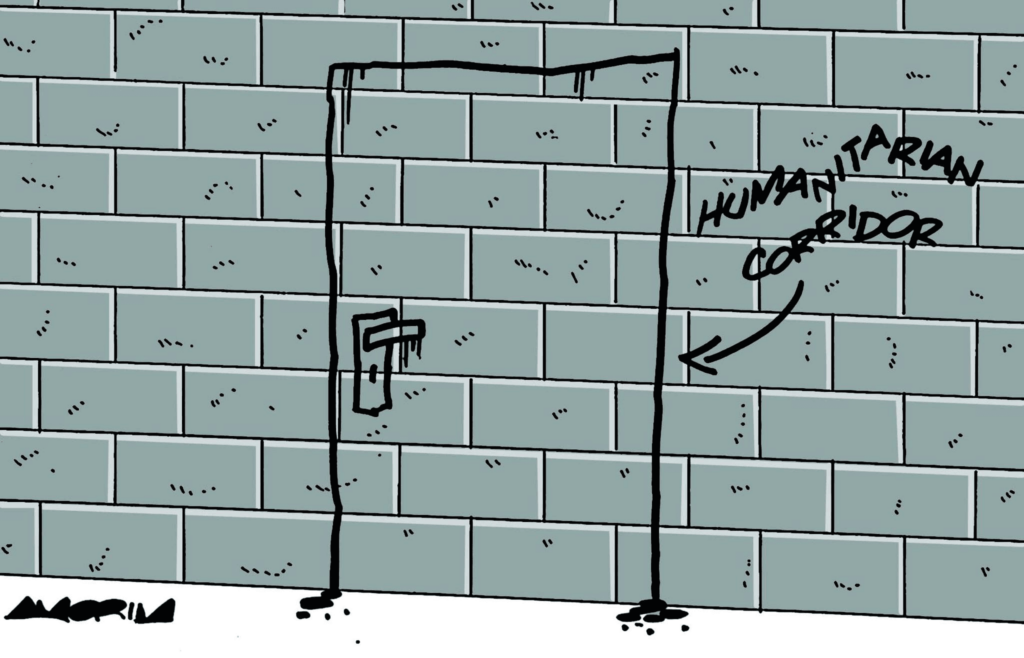
Brazilian cartoonist Amorim (Cartoon Movement) leads us off today with a reasonable critique of the humanitarian disaster unfolding in Gaza, where Israel’s response to the horrific Hamas attacks has combined air attacks on suspected terrorist sites with warnings to civilians to evacuate an already crowded area, while food, water, fuel and electricity have been cut off.
All this among reassurances that “humanitarian corridors” will allow the UN and other relief groups to help civilians survive, reassurances that seem, as Amorim puts it, to be entirely cosmetic.

Dutch cartoonist Maarten Wolterink (Cartoon Movement) accuses Biden’s trip of having resulted in empty promises, though it’s not clear that Israel continued to bomb the Rafah crossing after the meeting and there is no evidence of direct attacks on relief convoys.
The question here is to what extent hyperbole is a valid tool of the cartoonist versus a means of encouraging rumors?
That is, the gulf between promises and performance is not only worth exploring but critical in evaluating circumstances, but the resulting cartoon needs to be either obviously a metaphor or else a commentary on real events.

For instance, Jordanian Osama Hajjaj (Cartoon Movement) can be criticized for this homophobic depiction of the relationship between Biden and Netanyahu, and thus between the US and Israel, but it’s clearly metaphorical.
It is also hardly the only similar critique, with others coming from a variety of cartoonists from a variety of nations, each accusing the US of enabling Israeli policies towards Palestinian people, some more graphic than Hajjaj’s but also with more restrained versions echoing his criticism of the relationship.
Juxtaposition of the Day
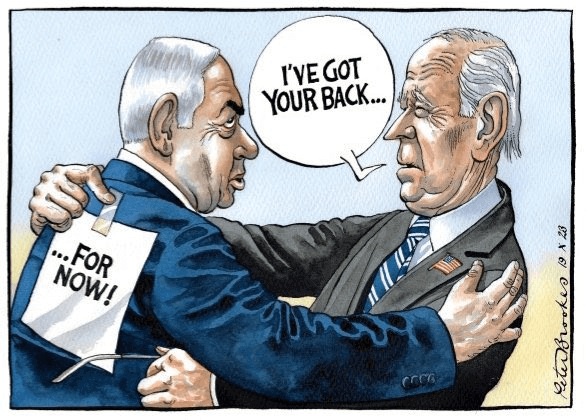


Three similar takes, the first from Britain, the second from an American cartooning for a British magazine and the third from this country.
Each echoes the analysis that, while Biden has pledged unwavering support for Israel’s right to exist and to address Hamas in a military fashion, it seems apparent that Biden also delivered some cautions, both from what he has said publicly and what he most likely said behind closed doors.
It reflects a practical view of a relationship steeped in realpolitik, in which the US endorses the Two State Solution of the Oslo Accords but seemingly turns a blind eye to continued settlements on the West Bank, and, while calling for fair treatment of Gaza’s civilians in the current crisis, vetoed a UN Security Council call for a temporary ceasefire.
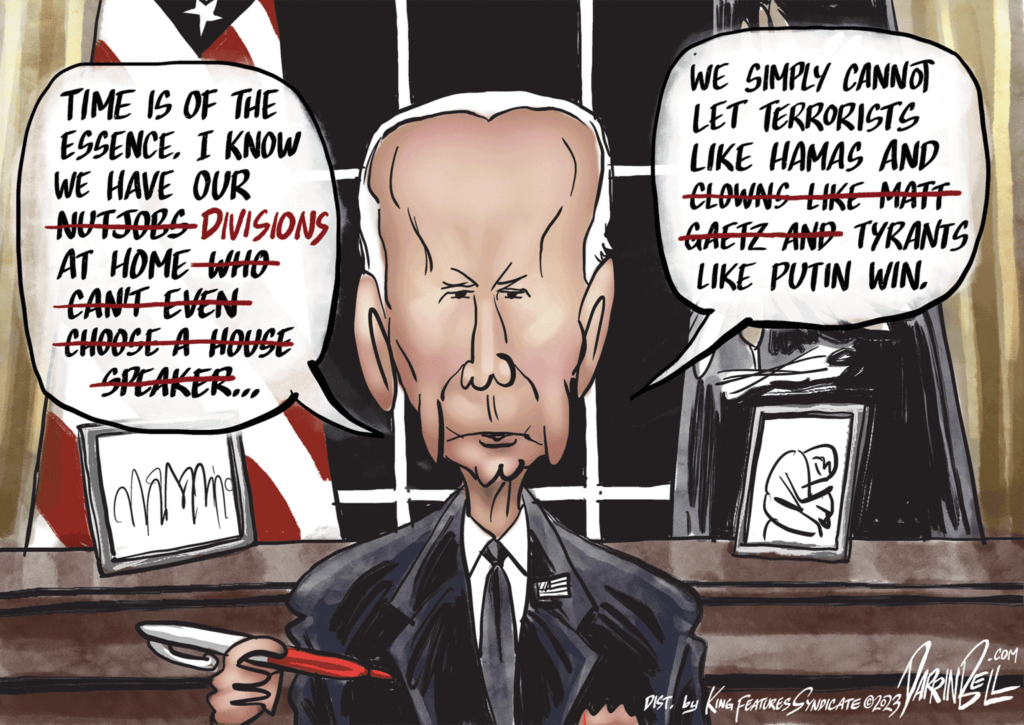
Darrin Bell (KFS) lays out the domestic limitations under which Biden is currently operating, his national speech the other night belied by the chaos and power-games that have hamstrung the House of Representatives. Bell does not have space to also squeeze in the interference of Tommy Tuberville in holding up military promotions or the number of ambassadors for that region which remain unconfirmed by the Senate.
A lesser president might have seized the opportunity to complain about those things, but Biden remained on message about the Middle East and let his audience fill in the blanks themselves, as Bell does here.
Perhaps Candidate Biden would have been more explicit, but President Biden was not. I guess we’ll see how that washes out, with the press breathlessly publishing hourly polls to keep everyone updated on the horserace campaign.

And let’s not kid ourselves, Brian McFadden says: We’ve managed to stir up the same sort of fervor once reserved for 9/11, when the flag lapels appeared and we were persuaded to believe that Iraq had some connection to bin Laden and al Qaeda.
How’d all that turn out, by the way? Does anyone remember?
Biden apparently does, because he publicly cautioned Israel specifically not to repeat our mistakes from that tragedy, and he took pains the other night to emphasize that aid to Ukraine is an alternative to direct military involvement if our lack of resolve were to encourage Russia to extend its clearly signaled ambitions into Poland and the Baltic States.
Did anyone hear that warning? Does anyone even want to listen? Can they?

From Morocco, Khalid Cherradi (Cartoon Movement) accuses Facebook of choking off Palestinian viewpoints and favoring Israeli posts.
I’m not sure of that, because I see enough people claiming to have their FB posts buried when they just don’t understand that the platform routinely shows you other people’s postings rather than your own.
I’m not denying the accusation, but I haven’t seen verified proof that Meta/Facebook is setting its algorithms to suppress one side of the debate.
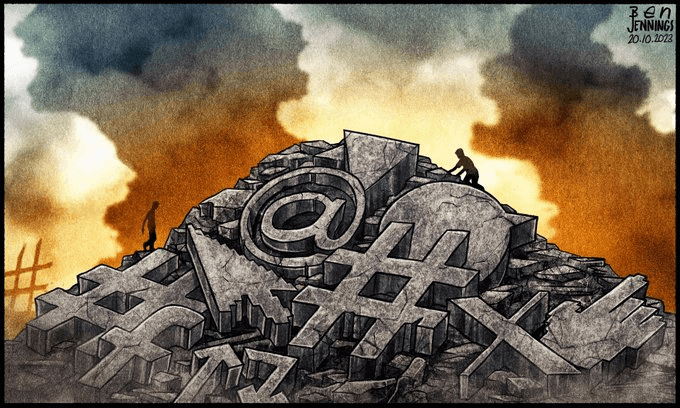
Still, as Ben Jennings points out, social media is proving to be a major source of, at best, unconfirmed rumors which don’t pan out and, at worst, outright lies that are mistakenly embraced as truth. It certainly doesn’t help that — under the increasing pressure of social media — even nominally responsible journalism sites are under pressure to be first with a story, rather than to wait and doublecheck for accuracy.
Newsguard, however, has verified that Muskie Muskrat has, through a combination of omission and commission, been helping spread toxic misinformation on X/Twitter, despite his comical sidekick’s repeated balloon juice about how swell everything is under the new, improved regime.

Read it and weep. It makes Fox and Newsmax look comparatively frank and honest.

There is some good news coming out of the region this morning: Al Jazeera reports that some of the trucks lined up at the Rafah crossing are finally being allowed through.
Twenty trucks out of 200 is hardly enough, and even if we dare hope that all 200 will be permitted to get past the gates, that won’t begin to serve the needs of 2.3 million people.
Nor will it satisfy those who agree with our second
Juxtaposition of the Day
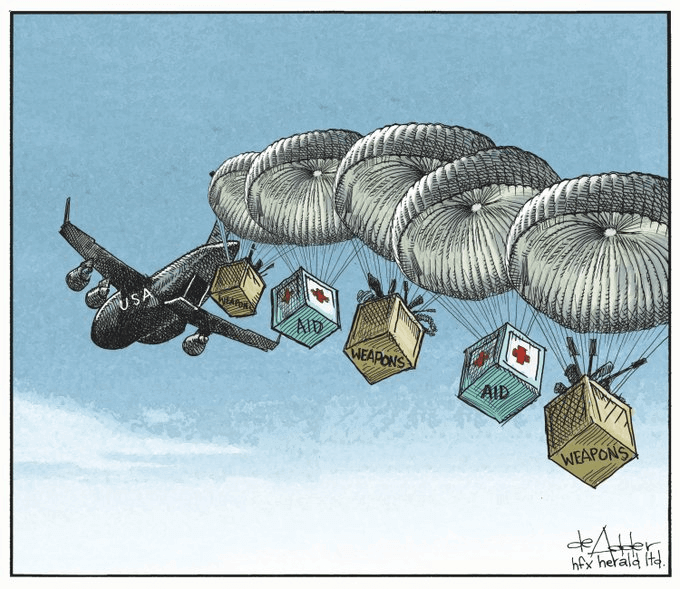
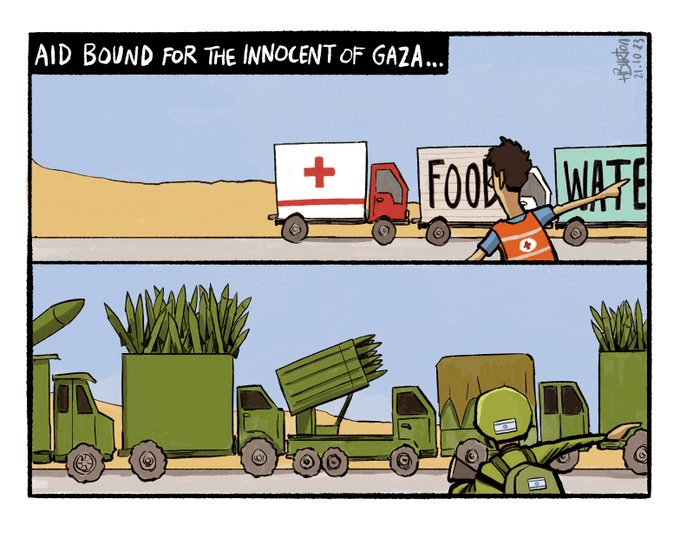
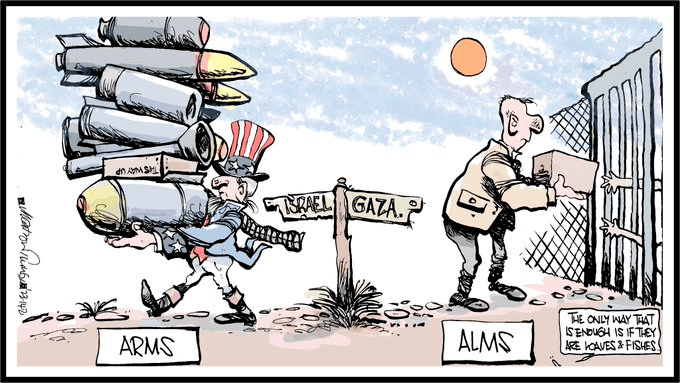
From the US, from the UK, from Ireland, the criticism is the same: We seem to be equally, if not more, fixated on sharing arms than sharing civilian aid. And as Turner says, unless they were passing through loaves and fishes, it could never be enough.
Though we might remember that those who reject divine explanations believe that, when Jesus handed out all that he had, it inspired others to do likewise, and thus the crowd was fed.
We could use that kind of miracle about now.
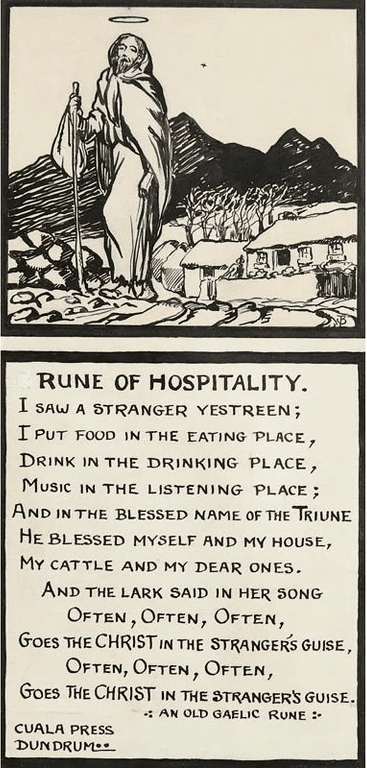

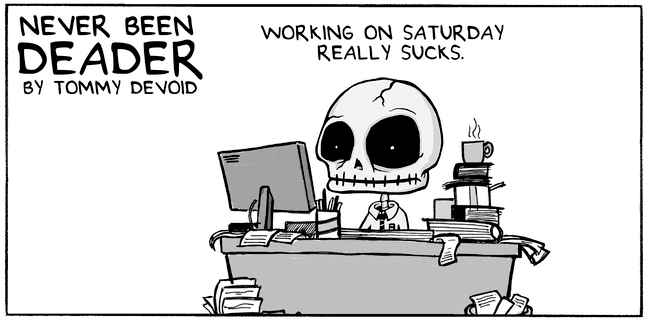
Comments 2
Comments are closed.